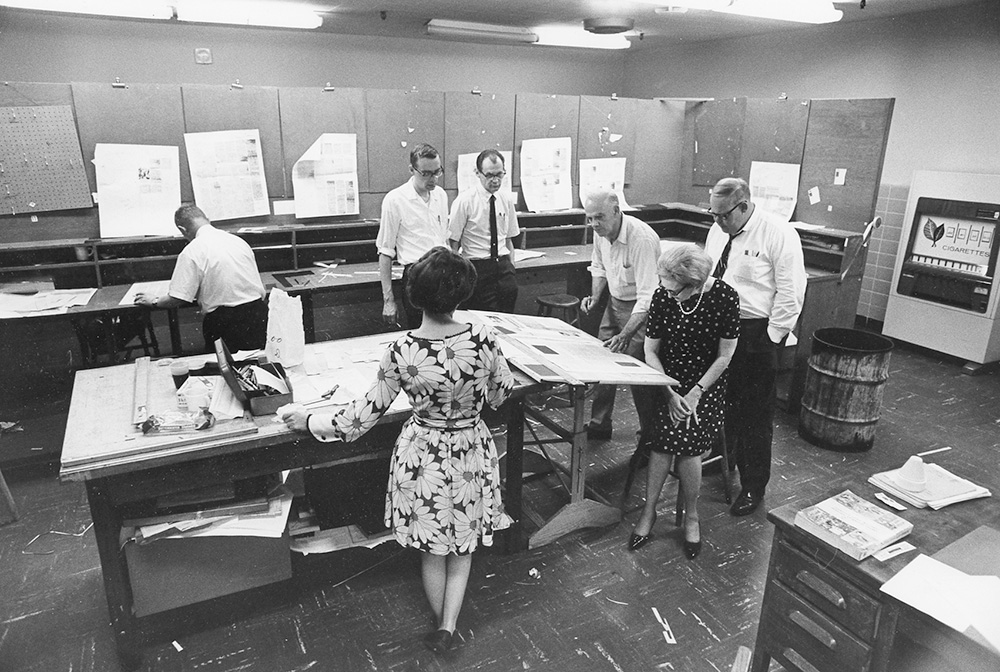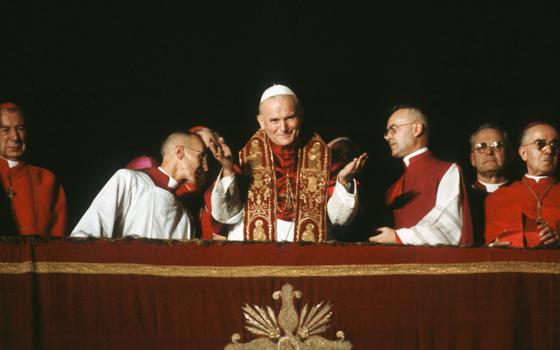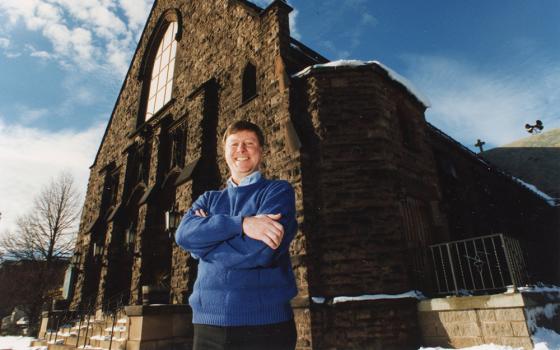
Staff at work in the early years of the National Catholic Reporter in Kansas City, Missouri (NCR file photo)
Sixty years ago, lay Catholics took on a bigger role in their faith.
It was the first Sunday of Advent, 1964. In most of the U.S., people walked into church to celebrate, for the first time, what came to be called the "New Mass."
The priest and altar now faced the congregation. Significant parts of the Mass were spoken in English (or the dominant local parish language). Lay lectors read the epistle of the day; laypeople were asked to carry the bread and wine up to the priest. They were expected to recite prayers out loud and sing songs during key parts of the celebration.
As The New York Times put it, "Churchgoers became participants rather than witnesses."
Around that same time, a group of Catholics in Kansas City, Missouri, decided laypeople should be stronger participants in church journalism, as well. The local bishop oversaw the diocesan newspaper, telling people what to write and what to ignore. (That's still true today in dioceses throughout the country.)
Robert Hoyt thought that was a bad idea. It was, he said, as if the mayor owned and ran the only news outlet in town — and expected everyone to just go along. He was convinced that lay reporters, independent of the bishop or any church funding and interference, could step up and do a better job. Hoyt and a group of friends started something they eventually named The National Catholic Reporter.
This year marks that newspaper's 60th anniversary.
NCR has been a key player in the life of the U.S. church throughout that time. In 1967, we reported exclusively on the heated arguments and dissents inside the Vatican's commission on birth control. NCR broke the priest abuse story in 1985 and was — for years — the only news organization to report extensively on the scandal. We were the first Catholic newspaper to focus heavily on environmental coverage.
That habit of going our own way continues today. Just this past October, NCR was the first to tell the world of a private meeting in Rome between Pope Francis and Loretto Sr. Jeannine Gramick, a leading advocate for LGBTQ Catholics. We had four reporters at the Vatican this fall, covering the synod on synodality, a groundbreaking event that included something never seen before: lay members in the room where it happens. And they were not mere witnesses but — in an echo of 1964 — participants and voters.
Advertisement
This year promises to be another crucial moment for the church and the country. In October, the second synod on synodality will convene in Rome, with a host of questions to address and revisit from the first gathering. Between now and then, the U.S. will experience yet another contentious presidential election; once again, some in the nation's Catholic hierarchy will likely feel compelled to plunge into a brand of culture war politics that tends to bring heat instead of light.
NCR will be there to report on all of this, using new tools to connect with more people than ever.
Over the years, we've moved from a print-only publication to a news outlet with a vital and vibrant online audience. In 2023, we strengthened our social media outreach and produced podcasts and videos. Early this year, we'll launch a smartphone app — giving wider audiences easier access to our journalism and commentary.
As we have evolved, the cornerstone of our founding 60 years ago has remained: NCR continues to be a respected source of reliable news and reasonable commentary. Mainstream journalists all over the country recognize that — and cover our reporting because they know it can be trusted.
In just the past year, NCR stories and reporters have appeared in The Washington Post, the Los Angeles Times, NPR, the BBC, the Associated Press, The Hill, Politico and CBS News. Our Vatican correspondent, Christopher White, is also a Vatican analyst for NBC News.
No other Catholic publication has that kind of impact on the wider media world. Our stories reverberate far beyond our own readership.
Over these six decades, we've developed something even mainstream media can't match: a dedicated community of readers and donors. They have enabled NCR to thrive and grow at a time when most news organizations are forced to cut back and do less.
As we begin to mark our 60th year, we'll turn to you for a special campaign to increase our endowment, so we can continue to expand our mission. The only way we can do our jobs as independent journalists is to be independent financially, just as we have been from the start. No official church organization runs us or funds us. NCR is a nonprofit that depends on people like you.
We'll present more details about our campaign in the weeks and months ahead. In the meantime, my thanks to you for all the support you've always given us throughout the decades.
At age 60, at this critical moment in church history, NCR's mission is more crucial than ever. We remain an organization made up of lay Catholics who believe the people in the pews should have a voice, the people in power should be held to account, and honest, truthful journalism — especially in this day and age — is something to treasure.







